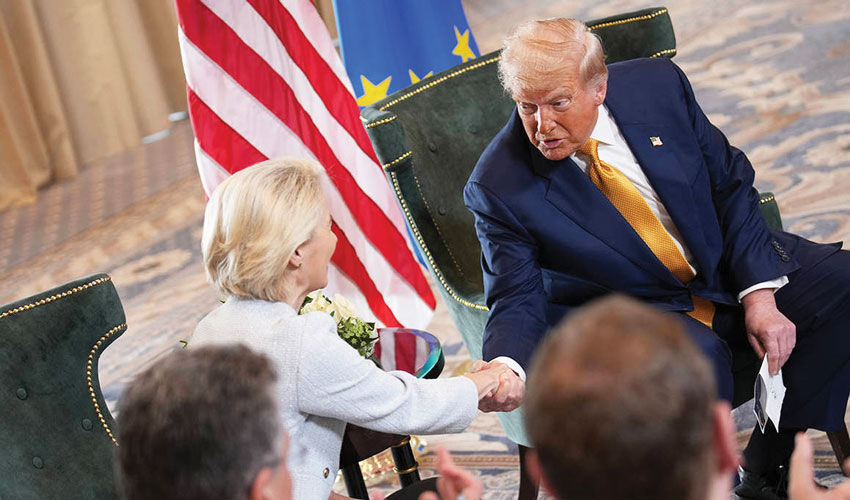
The economic consequences are immediate and severe. European exporters will face a duty that is almost ten times higher than the previous weighted average level of 1.6%. Volkswagen alone has estimated the impact of the U.S. duty increase at 1.3 billion euros.
However, the duty rate is only part of the problem. The real damage is that the EU agreed to pay for the “privilege” of maintaining access to the U.S. market, pledging to buy $750 billion worth of energy from America over three years and invest another $600 billion in the U.S. economy.
These shocking sums will inevitably divert resources away from European development and innovation. At the same time, they will legitimize bilateral coercion rather than the multilateral, rules-based World Trade Organization system. As critics correctly point out, this massive outflow of funds will come directly at the expense of domestic investment.
What is particularly troubling about this capitulation to the EU is that it was not necessary. As America’s largest economic partner, with an annual trade turnover of nearly $1 trillion, the EU has considerable leverage. While the US has a deficit in trade in goods with the EU ($235.6 billion), the EU has a deficit in trade in services with the US (€148 billion). This has opened up ample opportunities for retaliatory measures ranging from digital taxes to restrictions on US techno-giants.
A few weeks ago, anticipating this stalemate, European authorities prepared retaliatory duties on US goods worth €93 billion. However, the EU had a more powerful arsenal at its disposal. For example, its “Anti-Compulsion Instrument” (ACI) allows it to deny U.S. companies access to government contracts, cancel intellectual property rights, and impose broad trade restrictions. However, national leaders, fearing Trump’s retaliation and pressured by domestic businesses that badly want to retain access to the U.S. market, have refused to authorize von der Leyen to use these tools and forced her to negotiate from a weak position.
The contrast with other U.S. trading partners is striking. When Britain agreed to 10% duties with Trump in May, European leaders expressed concern about the likelihood of agreeing to similar terms. Now they are happily calling a 15% duty on EU exports a diplomatic breakthrough. The inconvenient truth is that Britain has single-handedly negotiated better terms for itself than the entire EU.
This failure exposes a fundamental weakness of governance in Europe. Lacking a true pan-European system of governance, the EU remains unable to coalesce competing national agendas into a common position. Because von der Leyen was constrained by EU countries that prioritize narrow domestic interests over European cohesion, the result is a deal that suits no one but Trump, because it locks Europe into a state of structural dependence.
The EU’s inability to fight back against Trump is particularly troubling given Europe’s stated goal of achieving strategic autonomy. Some might argue that this deal (technically not a formal trade agreement, but a set of statements guiding the negotiation process that has begun) helps buy time. According to this logic, the European Commission, by appeasing Trump, preserves transatlantic ties while opening up space for future bargaining on individual issues.
But if this were really a strategy designed to buy time, one would expect the EU to take concrete steps to develop strategic autonomy: increasing defense spending, accelerating the diversification of production chains, investing in retaliatory capabilities. Instead, EU leaders, who for years have promised to reduce dependence on foreign powers, chose to replace Russian energy imports with U.S. supplies and committed to large-scale purchases of U.S. military equipment.
Trump’s ability to secure sweeping economic concessions and defense spending commitments shows how effectively the U.S. can exploit Europe’s security concerns to achieve broad geopolitical goals. The $600 billion investment commitments, most of which are for military equipment, force Europe to subsidize U.S. defense contractors, weakening its own industrial base.
While the immediate crisis may have passed, the long-term damage to the EU’s credibility and autonomy will be severe. In the popular perception, Europe has surrendered without resistance, and this naturally provokes the creation of new problems for European interests.
Instead of trying to shift the blame to von der Leyen, EU countries should ask themselves whether, for the sake of avoiding a trade war, they should have abandoned Europe’s fundamental commitment to multilateralism and real paths to strategic autonomy. Unless European leaders muster the courage to break the cycle of dependency and allow EU institutions to firmly resist external coercion, such humiliating surrenders will become more and more common, turning the continent into a prosperous but powerless appendage of the American empire.
Alberto Alemanno
Professor of EU law at the École des Hautes Études Commerciales de Paris (HEC Paris),
visiting professor at the College of Europe in Bruges and Natolin,
founder of The Good Lobby.
© Project Syndicate, 2025.
www.project-syndicate.org

